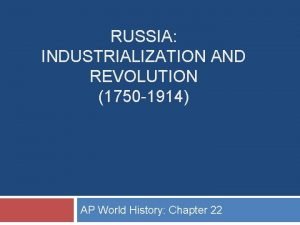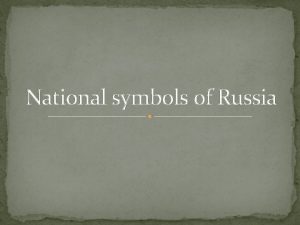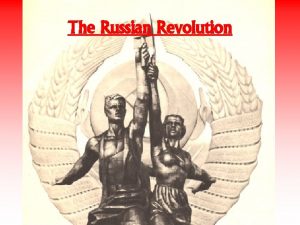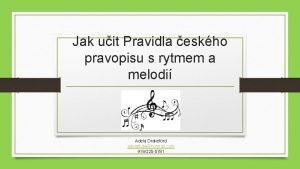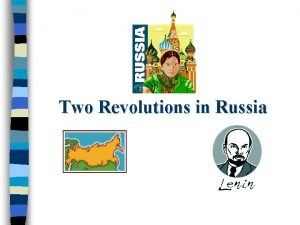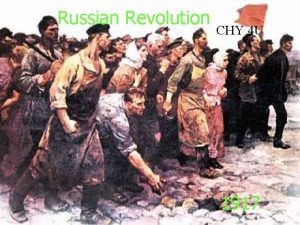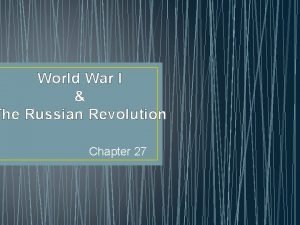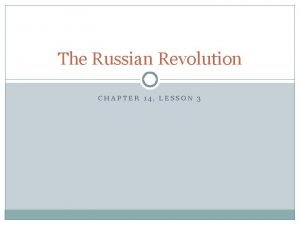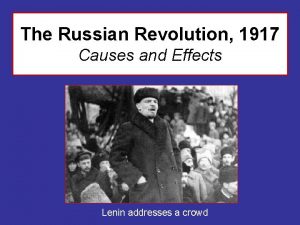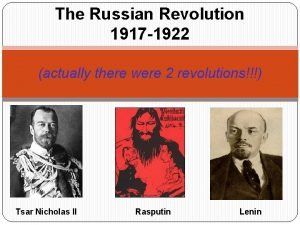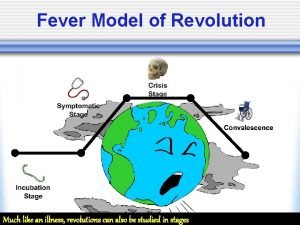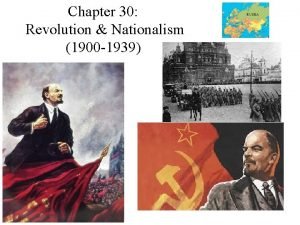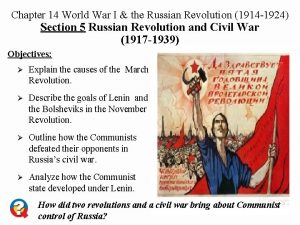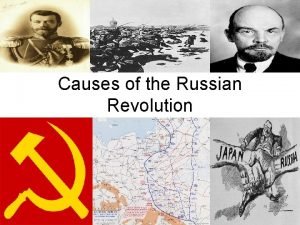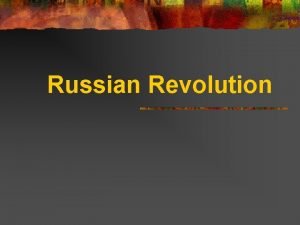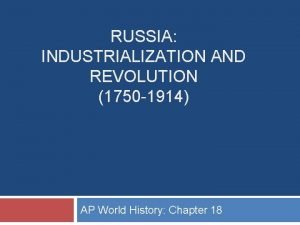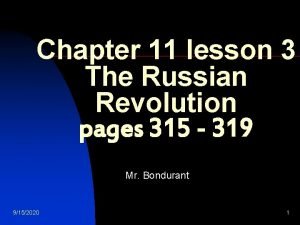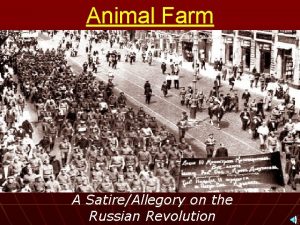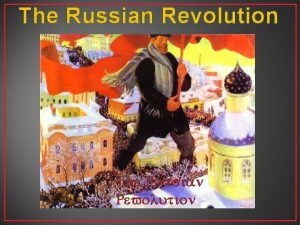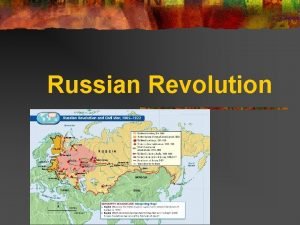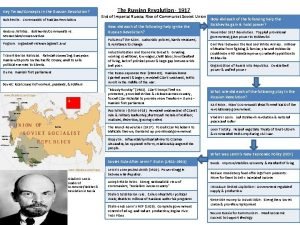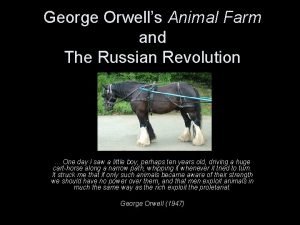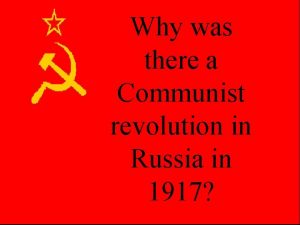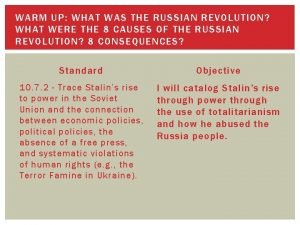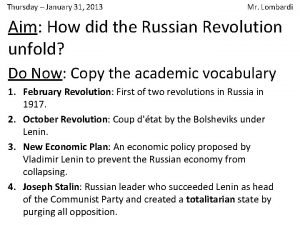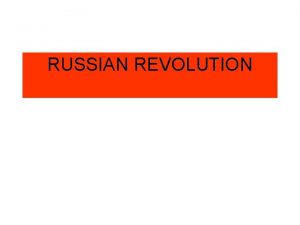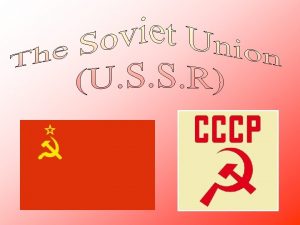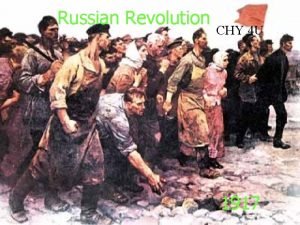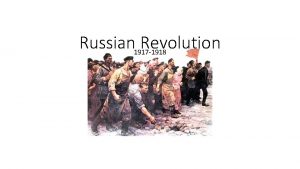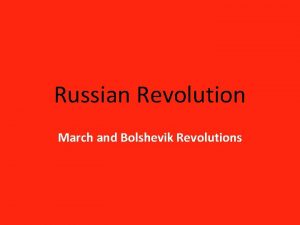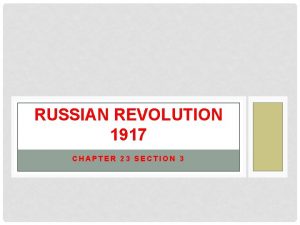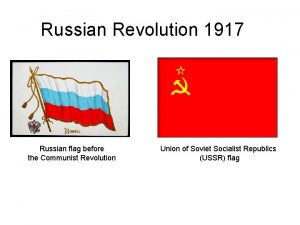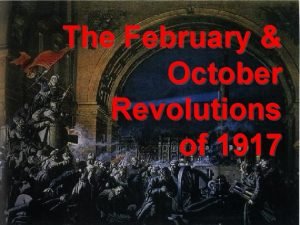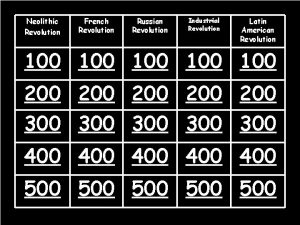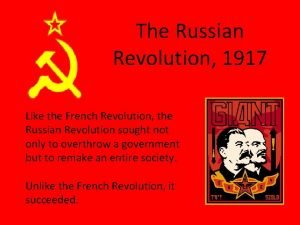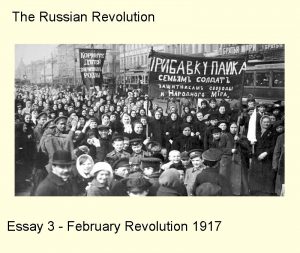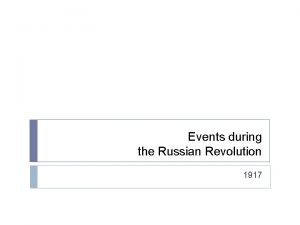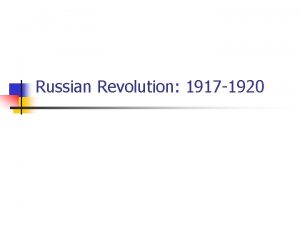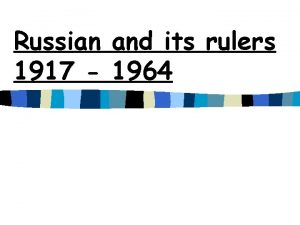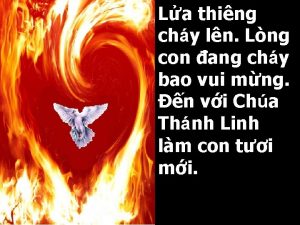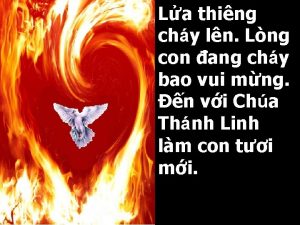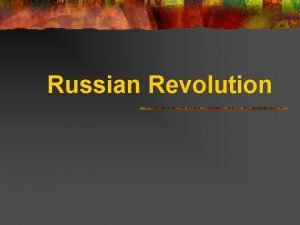Russian Revolution CHY 4 U 1917 Two Revolutions

































- Slides: 33

Russian Revolution CHY 4 U 1917

Two Revolutions • One to overthrow the Czar and establish a Provisional (temporary) Government = February 1917 = liberal • One to overthrow the Provisional Government = October 1917 = socialist Czar Nicholas II

Context: A Time of Change - Change after 1860 because of loss of Crimean War and losing power in Europe. - Czar Alexander II introduced Great Reforms – emancipation of the serfs, some local representation, etc. Ideological inspiration? - But he was killed and his successors introduced counter-reforms: - they were reactionary (censorship, revoke local control). Alexander II in 1861

Anti-Czarist Forces • Terrorists: – People’s Will, Land Freedom – Lenin’s brother executed for plotting to kill the czar in 1887 • Marxists: – Economic and scientific thinking, not emotion – “sooner or later” the oppressed and oppressors would come into conflict and revolution would change the political system • Both were highly repressed by Czar’s secret police (Okhrana) Helen Rappaport, Conspirator: Lenin in Exile (London: Hutchinson, 2009), xxiv, xxvi.

Context: 1905 - Humiliating loss of the Russo-Japanese War led to protests: - Troops fired on peaceful protesters (Bloody Sunday) - Peasants seized land - The Soviet (council) of workers was formed in St. Petersburg (all eventually put down by Czarist troops) - workers’ revolution, not socialist

Russo-Japanese War Editorial Cartoons American Japan-in-America: the Turn of the Twentieth Century. 2008. http: //www. indiana. edu/~jia 1915/war/weather 27. html (Nov. 16, 2012).

Ibid.

Russian Propaganda



1905 Petition “Sire! We workers and people of St. Petersburg…our wives, our children and aged and helpless parents, are come to Thee…to seek for truth and protection. We are become beggars, bowing under oppression and burdened by toil beyond our powers, scorned, no longer regarded as human beings, treated as slaves who must suffer their bitter lot in silence. And having suffered, we are driven deeper and deeper into the abyss of poverty, lawlessness, and ignorance. We have been strangled by despotism and arbitrary rule, and we have lost our breath. We have no more strength, Sire. The limit of our patience has been reached. There has come for us the grave moment when death is preferable to a continuation of our intolerable torture. ” Quoted in Rappaport, Conspirator, 108.

St. Petersburg Soviet Trotsky at the St. Petersburg Soviet of Workers Deputies, middle row, holding papers Trotsky Internet Archive, 2006, http: //www. marxists. org/archive/trotsky/1907/1905/index. htm (Nov. 30, 2011).

Russian Social Pyramid 1900 Elite: Czar and family, aristocrats Russian Orthodox Church Czarist military officers Middle class (bourgeoisie) Poor, peasants, farmers, workers

Industrialization *Late industrialization • Trans-Siberian railroad in the 1890 s built in 1890 s – 5000+ miles long *Led to more problems: *rapid urbanization *lack of housing *poor working conditions. . . *. . . that created more pressure for change – connected European part of Russia with the Pacific – built with loans from France

Putilov works, St Petersburg 1903 – making shells Ian Blanchard, Russian Industrialization, 1867 -1927/8, N. d. , http: //www. ianblanchard. com/Research%20 IB/Rus_Ind/Rus_ind. html (Nov. 15, 2012).

Nicholas’ Reforms • Czar Nicholas II promised some reforms after the 1905 Revolution – a Duma, or parliament – a constitution • But once in place the Duma supported the Czar who continued to have the most power The last Czar and his family

RSDLP • Russian Social Democratic Labour Party (an umbrella group of socialists of many types) • Lenin disliked Bernstein’s revisionists and Menshiviks: – “Such thinking – suggesting conciliation with capitalism and the monarchy – enraged Ulyanov [Lenin]. . . ” – Lenin wanted to use pamphlets, newspapers, professional secret agents, weapon smuggling to bring about incitement of the revolution – What Is To Be Done? (1902): “Ulyanov had no faith in the mass movement of the proletariat per se as a force for change: if left to its own devices, it would inevitably disintegrate and become petty and preoccupied with everyday bourgeois issues. ” – Menshiviks too soft – willing to wait too long Rappaport, Conspirator, 23, 53.

Party Organization • “Education – or, more correctly, indoctrination – was the key. The masses must be educated into class consciousness and a proper awareness of the battle ahead. But even with this level of political awareness they could achieve nothing in the wider arena without the leadership of an elite, scientifically informed, Marxist intelligentsia, whose role was to organise in the vanguard, in the utmost secrecy. Ulyanov was convinced that true political struggle had to be orchestrated by such a group of hardened, experienced professionals; they would do the thinking for the masses. The proletariat would remain, for him, merely an amorphous mass, the collective instrument of the party’s elite will. Having been indoctrinated by the party into a new revolutionary class consciousness, the masses would eventually bring into being the great socialist vision: the dictatorship of the proletariat. ” Rappaport, Conspirator, 53 -54.

Bolsheviks vs. Menshiviks • Bolshevik - Menshevik split in 1903 – Lenin and the Bolsheviks wanted to push revolution along by using professional revolutionaries – Mensheviks were more orthodox and wanted to wait until revolution occurred (when conditions were ripe)

Political Landscape in the Duma • Liberals (CADETS) or Constitutional Democrats • Socialists – Orthodox Marxists (gradual revolution) – Lenin and his Bolshevik followers didn’t have any members

First Parliament, 1905 Note the Czar opening the Duma University of Toronto, Research Repository, March Revolution, N. d. , https: //tspace. library. utoronto. ca/citd/Russian. Heritage/11. MR/MR. 8. html (Nov. 15, 2012).

World War I • Russia part of the Triple Entente • Faring very poorly in the war (5 million casualties, 1914 -1917) • Czar Nicholas went to the front leaving his (German) wife at home History Learning Site: Russia and World War One, 2012, http: //www. historylearningsite. co. uk/russia_and_world_war_one. htm (Nov. 16, 2012). • Lenin’s attitude to war: – imperialist – capitalist – get out! Pride in the Czar at the start of war


Rasputin • Manipulation? • Murdered in 1916 by aristocrats

February Revolution • Rioting spread • Duma asked Czar to abdicate • Established Provisional Government – to hold elections to a Constituent Assembly – write a new constitution – dual power with Soviets Burning tsarist emblems in Feb. 1917 in Petrograd

Provisional Government Only one socialist. U of T Research Repository, N. d. , https: //tspace. library. utoronto. ca/citd/Russian. Heritage/11. MR/MR. 10. html (Nov. 16, 2012).

Lenin’s Return • April Theses, 1917 – end the war – all power to the Soviets (don’t cooperate with the Provisional Gov’t) – Peace, Land, Bread To whom does this appeal? Lenin

October Revolution • Bolsheviks waiting for the right time to overthrow Provisional Gov’t – gaining power in Petrograd and Moscow Soviets – Bloodless? Coup Red Army

Civil War • Red (Communists) vs. Whites • Whites – foreigners – Czarists – others opposed to Bolsheviks • Red Victory - Red Army organized by Trotsky on Guard, 1920/21

Succession • Trotsky or Stalin

Lenin’s Death Lenin embalmed Lenin after his stroke, 1923 Lenin’s mausoleum

Idealization of Lenin Leads, 1924 5 th anniversary of Russian Revolution, 1929

Themes • Common causes of revolution – social and economic discontent – new theories, ideas (a program of change) – leader(s) to implement ideas – crisis • Lenin’s adaptation of socialism to suit Russian needs – compare to Marx’s theory
 Russian revolution of 1917 definition ap world history
Russian revolution of 1917 definition ap world history Triple alliance ap euro
Triple alliance ap euro Russian revolution vs french revolution
Russian revolution vs french revolution Russian national symbols
Russian national symbols March 1917 revolution
March 1917 revolution Hy chy ky ry dy ty ny básnička
Hy chy ky ry dy ty ny básnička Hy chy ky ry dy ty ny na zdi visí hodiny
Hy chy ky ry dy ty ny na zdi visí hodiny Chy china
Chy china Chy china
Chy china Dvouhlásky
Dvouhlásky A tale of two revolutions grade 10, 1080l
A tale of two revolutions grade 10, 1080l A tale of two revolutions grade 10, 1080l
A tale of two revolutions grade 10, 1080l World war 1 and the russian revolution chapter 27
World war 1 and the russian revolution chapter 27 Chapter 14 lesson 3 the russian revolution
Chapter 14 lesson 3 the russian revolution Causes and effects of the russian revolution
Causes and effects of the russian revolution Who lost territory after ww1
Who lost territory after ww1 Russia after ww1
Russia after ww1 Russian revolution cartoon
Russian revolution cartoon The fever model of revolutions
The fever model of revolutions Chapter 30 revolution and nationalism worksheet answers
Chapter 30 revolution and nationalism worksheet answers Kzbho6asboc -site:youtube.com
Kzbho6asboc -site:youtube.com Effect of russian revolution
Effect of russian revolution Http://www.history.com/topics/russian-revolution
Http://www.history.com/topics/russian-revolution Russian revolution of 1905 definition ap world history
Russian revolution of 1905 definition ap world history Lesson 3 the russian revolution
Lesson 3 the russian revolution Animal farm summary
Animal farm summary The russian revolution
The russian revolution The russian revolution
The russian revolution Russian revolution
Russian revolution The russian revolution
The russian revolution Introduction of russian revolution
Introduction of russian revolution Russian revolution causes and effects
Russian revolution causes and effects Causes of the russian revolution
Causes of the russian revolution Russian revolution
Russian revolution
